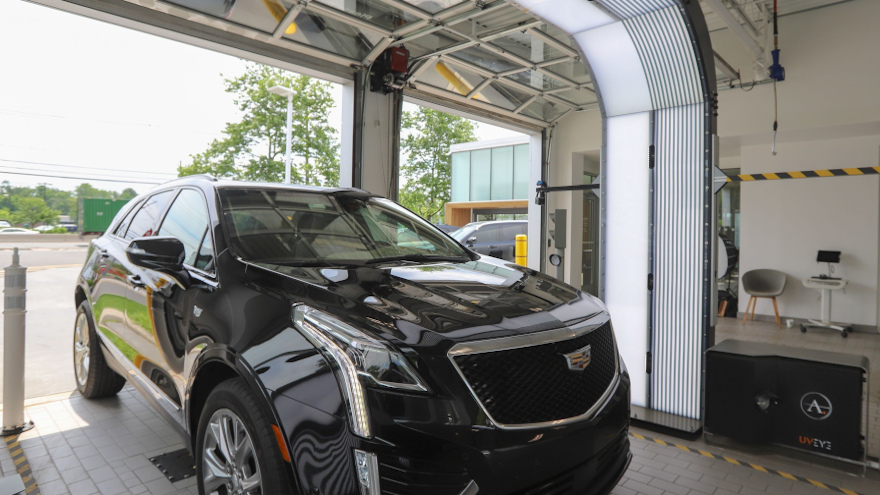GM Ventures invests in UVeye to help dealers & wholesale activities

UVeye's computer vision AI vehicle inspection system will be incorporated into Acadia Insurance's claims process through a new collaboration. Photo courtesy of UVeye.
By subscribing, you agree to receive communications from Auto Remarketing and our partners in accordance with our Privacy Policy. We may share your information with select partners and sponsors who may contact you about their products and services. You may unsubscribe at any time.
General Motors must like the potential of UVeye, a provider of advanced vehicle diagnostic systems.
This week, UVeye announced it has received an investment from the automaker’s capital venture arm — GM Ventures — to help fund the development and commercialization of the company’s vehicle inspection technology.
According to a news release, UVeye also has entered into a commercial agreement with GM to explore the expansion of UVeye’s automated high-speed systems to GM dealerships throughout various markets.
Serving as the venture capital arm of General Motors, GM Ventures strategically invests in startup companies that share GM’s enterprise vision of an all-electric, hands-free, and more seamlessly connected future, and are helping to position GM as a leading transportation technology enterprise.
As part of the strategic collaboration agreement, the two companies have agreed to work on a variety of vehicle-inspection technology projects involving used-vehicle auctions, fleet operations and dealership sales.
In the future, UVeye plans to incorporate electric-vehicle and autonomous-driving platforms into its inspection databases as well.
Subscribe to Auto Remarketing to stay informed and stay ahead.
By subscribing, you agree to receive communications from Auto Remarketing and our partners in accordance with our Privacy Policy. We may share your information with select partners and sponsors who may contact you about their products and services. You may unsubscribe at any time.
UVeye systems use artificial intelligence, machine-learning and high-definition camera technologies to quickly and accurately check tires, underbody components and vehicle exteriors for defects, missing parts and other safety-related issues.
More than 4,000 GM dealerships will be eligible to purchase the vehicle-inspection equipment to use in their service lanes. The team will also explore applications for extending the technology to exterior scans and photography to generate online interest and potential sales for used vehicles.
“We are on a journey to create the best customer service experience possible and the implementation of UVeye into our dealership service lanes helps us do that,” said John Roth, GM global vice president of customer care and aftersales.
“Providing real-time, consistent and accurate feedback to our customers will help us ensure they are getting the best performance out of their vehicle,” Roth continued in a news release
UVeye chief executive officer and co-founder Amir Hever highlighted that automated inspection processes take seconds to complete and are significantly more accurate than time-consuming manual inspections commonly in use today.
UVeye currently has facilities in North America, Europe and the Asia Pacific region, including offices in Israel, Japan, Germany and the United States. The company has formed strategic partnerships with numerous dealership groups, used-car auctions and vehicle fleets since it was founded in 2016.
GM dealerships have access to three high-speed UVeye systems that utilize a unique combination of proprietary algorithms, cloud architecture, artificial intelligence, machine learning and sensor-fusion technologies. They include:
—Helios: An underbody scanner that detects a wide variety of problems including frame damage, missing parts and fluid leaks, as well as brake and exhaust-system issues.
—Artemis: A system that checks tire quality. Within seconds it identifies tire brand, technical specifications, air pressure, tread depth, sidewall damage, alignment issues and whether or not a vehicle’s tires are mismatched.
—Atlas: A 360-degree detection system that checks sheet metal and other external body components such as bumpers, door locks, grilles and windows.
Hever believes that UVeye shares a common vision with General Motors for improved service quality that can benefit dealers, service technicians and customers alike.
“High-speed inspection equipment can serve as tools of empowerment for new- and used-car dealers,” Hever said in the news release. “We very much look forward to working with GM in the months and years ahead. Both companies share the same vision and sense of innovation and when it comes to vehicle quality, the future is a bright one.”
Early implementations of UVeye’s technology at a limited number of GM dealers in North America are already yielding positive results.
As the collaboration continues, the two companies said they will look to expand the applications of the technology across GM’s global dealer network, enhancing the robustness of real time vehicle diagnostics and creating a more streamlined exchange of information between customers, their vehicles and service technicians.


